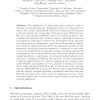Free Online Productivity Tools
i2Speak
i2Symbol
i2OCR
iTex2Img
iWeb2Print
iWeb2Shot
i2Type
iPdf2Split
iPdf2Merge
i2Bopomofo
i2Arabic
i2Style
i2Image
i2PDF
iLatex2Rtf
Sci2ools
110
click to vote
RECOMB
2006
Springer
2006
Springer
A Parsimony Approach to Genome-Wide Ortholog Assignment
The assignment of orthologous genes between a pair of genomes is a fundamental and challenging problem in comparative genomics, since many computational methods for solving various biological problems critically rely on bona fide orthologs as input. While it is usually done using sequence similarity search, we recently proposed a new combinatorial approach that combines sequence similarity and genome rearrangement. This paper continues the development of the approach and unites genome rearrangement events and (post-speciation) duplication events in a single framework under the parsimony principle. In this framework, orthologous genes are assumed to correspond to each other in the most parsimonious evolutionary scenario involving both genome rearrangement and (post-speciation) gene duplication. Besides several original algorithmic contributions, the enhanced method allows for the detection of inparalogs. Following this approach, we have implemented a high-throughput system for ortholog ...
Computational Biology | Genome Rearrangement | Iterated Exemplar Algorithm | Original Algorithmic Contributions | RECOMB 2006 |
| Added | 03 Dec 2009 |
| Updated | 03 Dec 2009 |
| Type | Conference |
| Year | 2006 |
| Where | RECOMB |
| Authors | Zheng Fu, Xin Chen, Vladimir Vacic, Peng Nan, Yang Zhong, Tao Jiang |
Comments (0)

